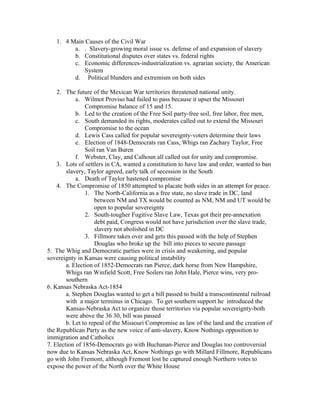
Causes of the Civil War and Attempts at Compromise
- 1. 1. 4 Main Causes of the Civil War a. . Slavery-growing moral issue vs. defense of and expansion of slavery b. Constitutional disputes over states vs. federal rights c. Economic differences-industrialization vs. agrarian society, the American System d. Political blunders and extremism on both sides 2. The future of the Mexican War territories threatened national unity. a. Wilmot Proviso had failed to pass because it upset the Missouri Compromise balance of 15 and 15. b. Led to the creation of the Free Soil party-free soil, free labor, free men, c. South demanded its rights, moderates called out to extend the Missouri Compromise to the ocean d. Lewis Cass called for popular sovereignty-voters determine their laws e. Election of 1848-Democrats ran Cass, Whigs ran Zachary Taylor, Free Soil ran Van Buren f. Webster, Clay, and Calhoun all called out for unity and compromise. 3. Lots of settlers in CA, wanted a constitution to have law and order, wanted to ban slavery, Taylor agreed, early talk of secession in the South a. Death of Taylor hastened compromise 4. The Compromise of 1850 attempted to placate both sides in an attempt for peace. 1. The North-California as a free state, no slave trade in DC, land between NM and TX would be counted as NM, NM and UT would be open to popular sovereignty 2. South-tougher Fugitive Slave Law, Texas got their pre-annexation debt paid, Congress would not have jurisdiction over the slave trade, slavery not abolished in DC 3. Fillmore takes over and gets this passed with the help of Stephen Douglas who broke up the bill into pieces to secure passage 5. The Whig and Democratic parties were in crisis and weakening, and popular sovereignty in Kansas were causing political instability a. Election of 1852-Democrats ran Pierce, dark horse from New Hampshire, Whigs ran Winfield Scott, Free Soilers ran John Hale, Pierce wins, very pro- southern 6. Kansas Nebraska Act-1854 a. Stephen Douglas wanted to get a bill passed to build a transcontinental railroad with a major terminus in Chicago. To get southern support he introduced the Kansas-Nebraska Act to organize those territories via popular sovereignty-both were above the 36 30, bill was passed b. Let to repeal of the Missouri Compromise as law of the land and the creation of the Republican Party as the new voice of anti-slavery, Know Nothings opposition to immigration and Catholics 7. Election of 1856-Democrats go with Buchanan-Pierce and Douglas too controversial now due to Kansas Nebraska Act, Know Nothings go with Millard Fillmore, Republicans go with John Fremont, although Fremont lost he captured enough Northern votes to expose the power of the North over the White House
- 2. 8. Bleeding Kansas-1856 a. Kansas was essentially free farmers opposed to slavery so Douglas expected them to vote against slavery b. Missouri sent in many homesteaders to try and sway the people toward slavery, called border ruffians c. New England Immigrant Aid Society responded by paying for abolitionists to settle in Kansas, d. fighting and violence broke out with abolitionists and border ruffians, town of Lawrence is sacked e. 2 governments emerged-LeCompton with slavery and Topeka without slavery, f. John Brown and the Pottawatomie Creek Massacre in retaliation for Lawrence 9. Senator Charles Sumner gave a speech in the Senate called the Crime Against Kansas, a. Congressman Preston Brooks, nephew of Andrew Butler in the Senate, came onto the floor and beat Sumner into unconsciousness with a cane. b. House voted to censure him, he resigns and is then reelected 10. Constitutional Issues a. LeCompton constitution-Buchanon asked Congress to accept it even though it did not reflect the will of the majority, Congress did not, Kansas rejected it b. Dred Scott v Sanford-slave in Missouri, traveled to Wisconsin, sued for freedom 1. Taney was chief justice-ruled that Scott couldn’t sue because he wasn’t a citizen, Congress could not deprive people of property without due process so Congress couldn’t exclude slavery from any area, Missouri Compromise was unconstitutional c. Lincoln Douglas debates-Douglas running for Senate seat in Illinois, Lincoln ran against him, house divided speech, issue was slavery, Freeport doctrine, Douglas won but this put Lincoln on the national stage 11. Agitation over slavery a. Fugitive slave act b. Underground Railroad and Harriet Tubman c. Literature-Uncle Tom’s Cabin, Impending Crisis of the South, Sociology for the South(equal rights for unequal men) and Cannibals All(capitalist system worse then slavery)(George Fitzhugh)